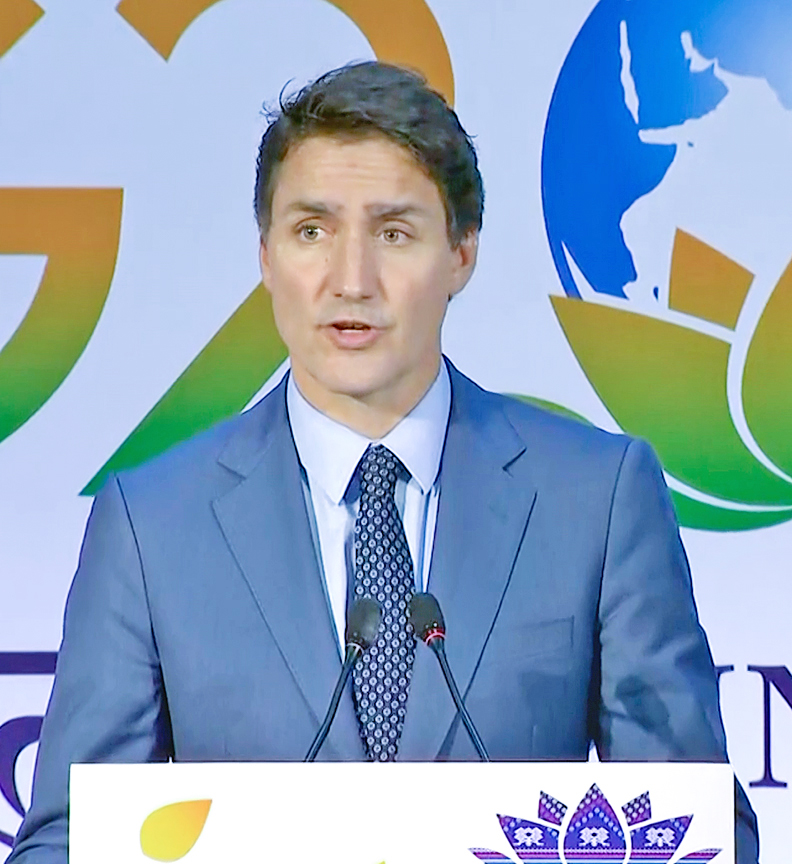


Canada’s Opposition leader, Pierre Poilievre, was scathing in his criticism of Canadian Prime Minister Justin Trudeau in an interview, calling him “incompetent” and “unprofessional” for mishandling Canada’s relations with India. He also promised to restore Canada’s relationship with India once he comes to power. Given that Canada’s elections are two years away, it seems India will have to wait until 2025 for things to get better—so nearly another 700 days of Trudeau going around complaining to the US, UK, UAE, and anyone who is willing to pick up his phone call, on why India needs to follow the rule of law. It would have been easier for him perhaps to produce some actual evidence in the time he has spent lobbying against India, a country he has accused of killing Khalistani terrorist Hardeep Singh Nijjar on Canadian soil. But then there is no real evidence, is there? This became more than evident during a press conference by Canadian Foreign Minister Melanie Joly, where she kept evading the question if Canada had given some evidence to India. If elections are held in Canada today, it is almost a certainty that Poilievre will become Prime Minister, as he is polling better numbers than the combined numbers of Justin Trudeau and his ally Jagmeet Singh, so unpopular Trudeau’s government currently is. Ironically, the more unpopular Trudeau becomes domestically, the more India can expect him to dig in his heels and ask for “justice” for Nijjar, as that resonates with his and Jagmeet’s Khalistani vote bank. He thinks his charges against India show him as a crusader for the Khalistani cause, even though it was on many of these people that Trudeau had cracked the whip during the truckers’ protest against his government last year. The bottom line is, India’s Trudeau problem is not going away soon, and two years are a long time in politics, so any speculation about a change in government is just that—speculation. A country’s foreign policy is supposed to be above partisan politics. Both government and opposition are meant to put the country’s interest ahead of partisan or a leader’s personal interests, a lesson Trudeau has not learnt, which is a telling commentary on how his own interests have come to dictate his policy. While he regularly kowtows to the Chinese, who he is close to, he thinks India is a pushover and he can get away by crying “murder”, just because Canada is a G7 and Five Eyes member. He did not expect India’s pushback and is now playing the victim. His initial attempts to rally Canadians around him on the issue of Canada’s sovereignty under threat may have met with partial success, with even Poilievre standing by the government. But Poilievre’s latest comments show that better sense has prevailed and he has started seeing through the charges made by Trudeau, who is yet to show a shred of proof for the “credible allegations” he has made against India.
However, that does not seem to be the case with the Five Eyes countries that are asking India to cooperate with Canada in the investigation of the killing of Nijjar, or are speaking disapprovingly of India’s push for the downsizing of Canada’s diplomatic staff in India for the sake of parity. Is it a case of the white boys’ club standing up for each other? But how much of these words actually translate into action against India is a matter of conjecture. It remains to be seen if the US would put its thriving partnership with India at risk because Trudeau is sulking. Common sense suggests it to be unlikely.
Amid this, the usual India-baiters are out in full force internationally, wondering if India is the right kind of partner for the “evolved” and “values-based” western democracies. It’s a different matter that western evolution and values include bombing innocent civilians and calling them collateral damage, and/or assassinating foreign nationals even in peacetime, the murder of Iranian general Qasem Soleimani through a drone strike being a case in point. The attempt seems to be to drive a wedge between India and the West, especially the United States under the guise of protecting Mr Trudeau’s “honour”. Trudeau too seems to be doing something similar. Whether or not he is being inspired to take this path by his comrades in Beijing is not known, but what is known is that countries often have to pay a price for the irresponsible actions of the men who lead them, especially if they are men of straw. If getting a Canadian visa gets difficult for Indian students because of a reduction in the size of the diplomatic staff in Canada’s missions here, and Canada’s education system takes a hit subsequently, the blame lies at Trudeau’s door. Lentil trade between the two countries is slowing, which will hit Canada’s lentil producing farmers—again because of Trudeau. If India takes Canada to the FATF for ignoring the mounds of dossier it has given against Khalistani terrorists and their funders operating freely from Canadian soil, it is again Trudeau’s fault. On Wednesday, India decided to resume certain visa services for Canadian citizens, but that does not mean it will stop building pressure on Trudeau’s government for acting on India’s legitimate concerns. It will be sensible on Trudeau’s part to pay heed to India and not escalate matters by seeking action against India, which is in no mood to sit silently. If Trudeau behaves like a leader and not a petulant school boy, maybe India-Canada relations too can survive his next 700 days in office.